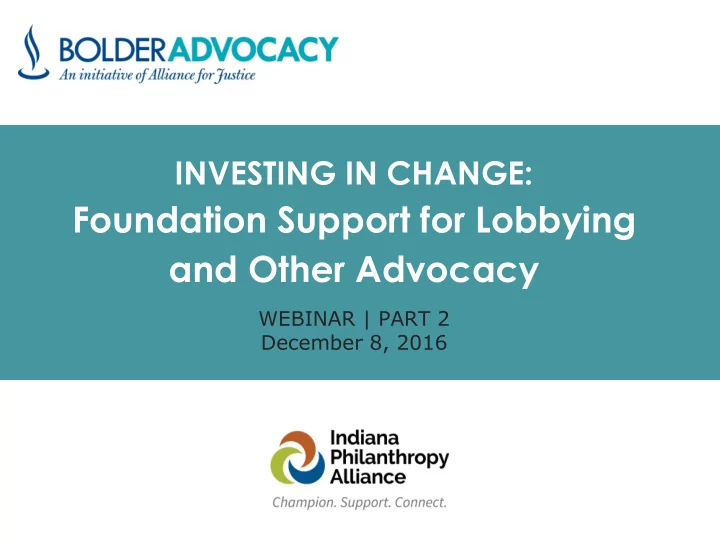

INVESTING IN CHANGE: Foundation Support for Lobbying and Other Advocacy WEBINAR | PART 2 December 8, 2016
501(c)(4) 501(c)(3) 501(c)(3) social welfare Public charity Private foundation Examples tax-exempt tax-exempt contributions Tax tax-exempt contributions tax- tax-deductible Treatment deductible Lobbying unlimited limited Prohibitively taxed Activities Cannot support or cannot support or Electoral oppose a candidate oppose a candidate secondary activity Activities for office for office
Avenues of ADVOCACY
Supporting ADVOCACY
General Support Grants Make Lobbying Grants funding grantees that advocate public or community foundations through general support can fund lobbying directly Specific Project Grants Fund Electoral Activities funding non-lobbying portions of advocacy includes nonpartisan advocacy projects electoral activities HOW CAN FOUNDATIONS SUPPORT ADVOCACY ?
Public Foundations CAN Lobby Public foundations can lobby ▪ Insubstantial part test OR ▪ 501(h) expenditure test
Private Foundations Tax on Lobbying Private foundations pay tax on lobbying expenditures ▪ 20% on foundation; 5% on managers ▪ 100% on foundation; 50% on managers
INSUBSTANTIAL PART TEST 1. Default test 2. What is “insubstantial”? 3. Lobbying not defined 4. Activities-based 5. Penalty or 501(H) EXPENDITURE TEST 1. Dollar-based limits 2. One-time election – IRS Form 5768 3. Expenditures only 4. Definition of lobbying 5. Penalty less severe
1. Calculate organization’s annual expenditures. 2. Overall lobbying limit: ANNUAL EXPENDITURES OVERALL LOBBYING LIMIT $500,000 or less 20% $100,000 +15% of excess over $500,000 to $1 million $500,000 $175,000 +10% of excess over $1 $1 million to $1.5 million million $225,000 + 5% of excess over $1.5 $1.5 million to $17 million million Over $17 million $1,000,000 3. Grassroots lobbying limit is 25% of overall limit.
DIRECT communication WHAT IS legislator expresses a view LOBBYING about specific legislation UNDER THE 501(h) GRASSROOTS communication general public ELECTION? expresses a view about specific legislation call to action
DIRECT communication legislator expresses a view about specific legislation GRASSROOTS communication general public expresses a view about specific legislation call to action
Federal DIRECT Members of Congress communication legislator expresses a view State about specific legislation State Legislature GRASSROOTS Local communication City Council, County Board of Supervisors general public expresses a view about specific International legislation Foreign Body call to action Legislative in Nature
DIRECT communication legislator expresses a view about specific legislation GRASSROOTS Who is a legislator? communication President, governor, mayor, or other executive official who participates in the formulation of legislation. general public expresses a view about specific legislation call to action
school boards zoning boards housing authorities sewer and water districts other “special purpose bodies” NOT LEGISLATORS
DIRECT communication legislator expresses a view about specific legislation GRASSROOTS communication general public expresses a view about specific legislation call to action
SPECIFIC LEGISLATION The August recess isn’t meant for playtime! Ask Congress to include crucial civil rights priorities in the Elementary and Secondary Education Act. ISSUE: ESEA Reauthorization
NOT SPECIFIC LEGISLATION Ensure equal opportunity in education for all children. Support civil rights protections for underserved students. ISSUE: Civil Rights Protections in Schools
regulations executive orders enforcement of existing laws litigation NOT SPECIFIC LEGISLATION
DIRECT communication legislator expresses a view CALL TO about specific legislation ACTION GRASSROOTS communication general public expresses a view about specific legislation call to action
DIRECT TELLING TO CONTACT communication legislator(s) legislator expresses a view PROVIDING ADDRESS, about specific telephone number, and/or other legislation contact information of legislator(s) GRASSROOTS PROVIDING MECHANISM to enable communication communication with legislator(s) general public expresses a view IDENTIFYING about specific legislator(s) legislation call to action
DIRECT communication legislator expresses a view about specific legislation GRASSROOTS communication general public expresses a view about specific legislation call to action
DIRECT communication legislator expresses a view about specific legislation GRASSROOTS communication general public expresses a view about specific legislation call to action
DIRECT communication legislator NOT calls to action: expresses a view about specific “Learn more!” legislation “Take action!” “Support our efforts!” GRASSROOTS “Get involved!” communication general public expresses a view about specific legislation NOT LOBBYING call to action
nonpartisan analysis, study, or research request for technical assistance self-defense examinations and discussions of broad social, economic, and similar problems LOBBYING EXCEPTIONS
MUST represent full and fair discussion be broadly disseminated NONPARTISAN ANALYSIS MAY express a view contain indirect call to action limit subsequent grassroots lobbying
TECHNICAL MUST BE ASSISTANCE invited in writing on behalf of committee available to all members of committee MAY express a view on Specific legislation
MUST RELATE TO powers and duties tax-exempt status deductibility of contributions SHOULD SELF- DEFENSE consult with attorney
NO SPECIFIC ANALYSIS + LEGISLATION blue ribbon panel DISCUSSIONS annual reports early stages of policy development NO CALL TO ACTION communication does not include call to action
Advocating for or against a ballot measure is direct lobbying
A public charity or a community/public foundation may EARMARK a grant for lobbying, but must count the grant against its own LOBBYING LIMIT
Private foundations should not EARMARK grants for lobbying but… Private foundations may FUND grantees that lobby $$$ General Specific Support Project Grants Grants
EARMARKED for Lobbying? Private foundation Public foundation
If a foundation grant is less than or equal to a project’s non -lobbying component, the grant is not a lobbying expenditure . Specific project’s ≤ non-lobbying Foundation grant amount SPECIFIC PROJECT GRANT “SAFE HARBOR”
HOW PROJECT GRANT RULE WORKS
Restricting public charity grantees from lobbying is not necessary Restrictive grant clauses limit grantees’ flexibility to accomplish their missions and ability to lobby within their own limits Grant can say it is not “ earmarked for lobbying” Lobbying restriction is only necessary when private foundation makes grant to non- 501(c)(3) organizations Grant AGREEMENTS
WEST COAST EAST COAST 436 14 th Street 11 Dupont Circle NW Suite 425 2 nd Floor Oakland, CA 94612 Washington, D.C. 20036 510-444-6070 202-822-6070 1000 N Alameda Street TEXAS Suite 340 501 Elm Street Los Angeles, CA 90012 Suite 450 213-346-3288 Dallas, Texas 75202 (214) 530-9144 866-675-6229 advocacy@afj.org www.bolderadvocacy.org @AFJBeBold www.facebook.com/BolderAdvocacy
Recommend
More recommend